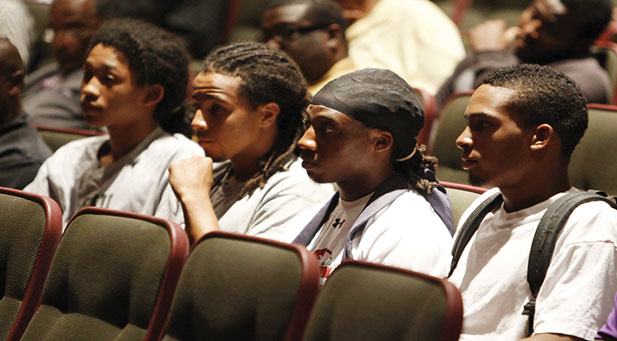

First HBCU Symposium: What can we do to save our Black colleges and our Black student/athletes
From Dion Henry
What is the purpose of HBCU’s? Sounds like a crazy question until you start to synthesize where African-Americans would be without them. A world without HBCUs would be a world without the leadership of Dr. Martin Luther King, Jr. or the media impact of Oprah Winfrey. King is a graduate of Morehouse College and Winfrey graduated from Tennessee State University. It’s been 173 years since the first Historically Black College or University (HBCU) was established, but in these times in America some people are asking: Are HBCUs still relevant?
Dr. Henry Lewis III was extremely adamant about the significant roles that HBCUs have played in his life and after all he is the 12th president of South Florida’s only HBCU’s Florida Memorial University (FMU) and the second oldest of the three HBCUs in the state of Florida.
“It is because of an HBCU that I am who I am today. I received my Bachelor of Science Degree in Pharmacy from Florida Agricultural and Mechanical University (FAMU)”.
As recently as 1960, 70 percent of all Black college students attended an HBCU, but this percentage has declined. More Black students are enrolling in majority institutions than ever before.
Colleges and universities a-cross the country are seeking the enrollment of the brightest Black students, causing HBCUs to compete for their normal student base. With homecoming football games, battle of the bands, and step shows receiving national publicity, many are forgetting the significance and educational opportunities HBCUs still offer to today’s society.
“I was a division one college athlete at a White university. I had to learn from a very harsh experience that I got tricked and trapped”, said Guy Wheeler one of the presenters.
Guy was reinforcing the fact that HBCUs treat their students with a kindred spirit in a nurturing environment. “At one time during my college career, I thought my name was my social security number, cause that’s how they referred to me”.
The Westside Gazette partnered with AWARE (Athletes Working and Achieving Realistic Education) to start moving the cogs on the HBCU wheel in the Broward County family. “We believe that we can make a difference in our communities by reminding them of what our cornerstones use to be in the Black community”, Mark James (CEO of AWARE stated.
Last Wednesday at the African American Research Library and Cultural Center (AARLCC) this duo did just that by hosting their first ever HBCU Student/Athlete Symposium. This event was well attended and the panel was star-studded with gems of the communities that have been making a difference impacting the lives of youths in our community.
The panel consisted of Dr. Henry Lewis III, president of (FMU); Sherry Williams- Reece, South Florida Director of the Infinite Scholar Program; Elder Mathes Guice of Koinonia Worship Center; Guy Wheeler CEO/President of JUSTICE FOR LIFE and Tracy Martin, CEO of Justice for Trayvon Martin Foundation.
In February, President Obama signed the executive order to strengthen the White House Initiative on HBCUs. President Obama proposed a budget increase, with funding for renovations, repairs, construction, new loans, and to increase the HBCUs graduates.
Understanding the need to keep HBCUs alive and active the symposium goal was to introduce the audience, which consisted mostly of high school student/athletes and their parents along with other interested students.
“One thing that I can say without reservation is that I learned to appreciate and love my experience from attending an HBCU, it shaped and gave me something to stand on with pride”. President Lewis continues to lay the foundation for the purpose and the need to keep our HBCUs alive. “You won’t find a more nurturing environment to grow as a well rounded student with a solid foundation that will allow you to compete on any level against anybody”.
While Elder Guice was instrumental in forewarning the audience about the status and present condition of the dismal graduation rate of the Black males. He also gave an over-view of his past job within the law enforcement. “You can either go to a state university or to a state prison, it’s your choice”.
Ms. Reece offers the students a way to get scholarships to fulfill their dreams even if they don’t get an athletic scholarship. “I don’t favor athletic scholarships. I believe that there are too many constraints. Our program offers you full scholarships if you come to our program in November with the necessary paper work filled out ‘correctly’ and qualifications, we will get you into a college.” Tracy Martin, a former little league coach and community activist shared his emotional roller coaster ride with the situations and complications surrounding the tragic death of his son, Trayvon Martin. Address coming up in a tough neighborhood with no father. “You have to be better than any other people. It’s not fair but you have to. I was raised in a very poor neighborhood and by a single mother. I wanted to get out of St. Louis and I made up my mind, to. You have to believe in yourself and trust God”.
“This symposium is the first of more to come. We want to give our student/athletes an opportunity to understand and a chance to peep into the Black college experience because they won’t or can’t at any other institutions.”


Be the first to comment